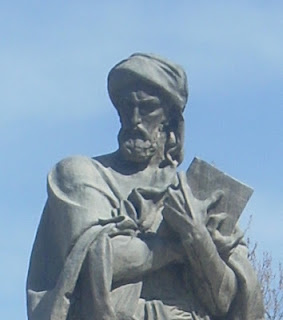
Ab? Al? al-?usayn ibn Abd All?h ibn S?n? commonly known as Ibn S?n? or by his nameLatinized Avicenna, a note able scientists of Golden age who wrote almost 450 treatises on a wide range of subjects, of which around 240 have survived. In particular, 150 of his surviving treatises concentrate on philosophy and 40 of them concentrate on medicine.
Ibn Sina was a Persian polymath and the foremost physician and Islamic philosopher of his time. He was also an astronomer, chemist, Hafiz, logician, mathematician, physicist, poet, psychologist, scientist, Sheikh, soldier, statesman and theologian.
His most famous works are The Book of Healing, a vast philosophical and scientific encyclopaedia, and The Canon of Medicine, which was a standard medical text at many Islamic and European universities up until the early 19th century .
Ibn S?n? is regarded as a father of early modern medicine, and clinical pharmacology particularly for his introduction of systematic experimentation and quantification into the study of physiology,] his discovery of the contagious nature of infectious diseases, the introduction of quarantine to limit the spread of contagious diseases, the introduction of experimental medicine, evidence-based medicine, clinical trials, randomized controlled trials, efficacy tests, clinical pharmacology, neuropsychiatry, risk factor analysis, and the idea of a syndrome and the importance of dietetics and the influence of climate and environment on health. He is also considered the father of the fundamental concept of momentum in physics, and regarded as a pioneer of aromatherapy.
George Sarton,, the father of the history of science, wrote in the Introduction to the History of Science:
“One of the most famous exponents of Muslim universalism and an eminent figure in Islamic learning was Ibn Sina, known in the West as Avicenna (981-1037). For a thousand years he has retained his original renown as one of the greatest thinkers and medical scholars in history. His most important medical works are the Qanun (Canon) and a treatise on Cardiac drugs. The ‘Qanun fi-l-Tibb’ is an immense encyclopedia of medicine. It contains some of the most illuminating thoughts pertaining to distinction of mediastinitis from pleurisy; contagious nature of phthisis; distribution of diseases by water and soil; careful description of skin troubles; of sexual diseases and perversions; of nervous ailments.
Tags: Ibn S?n?, Math, Modern Science, Muslim Science Celebrity
Leave a Reply
You must be logged in to post a comment.